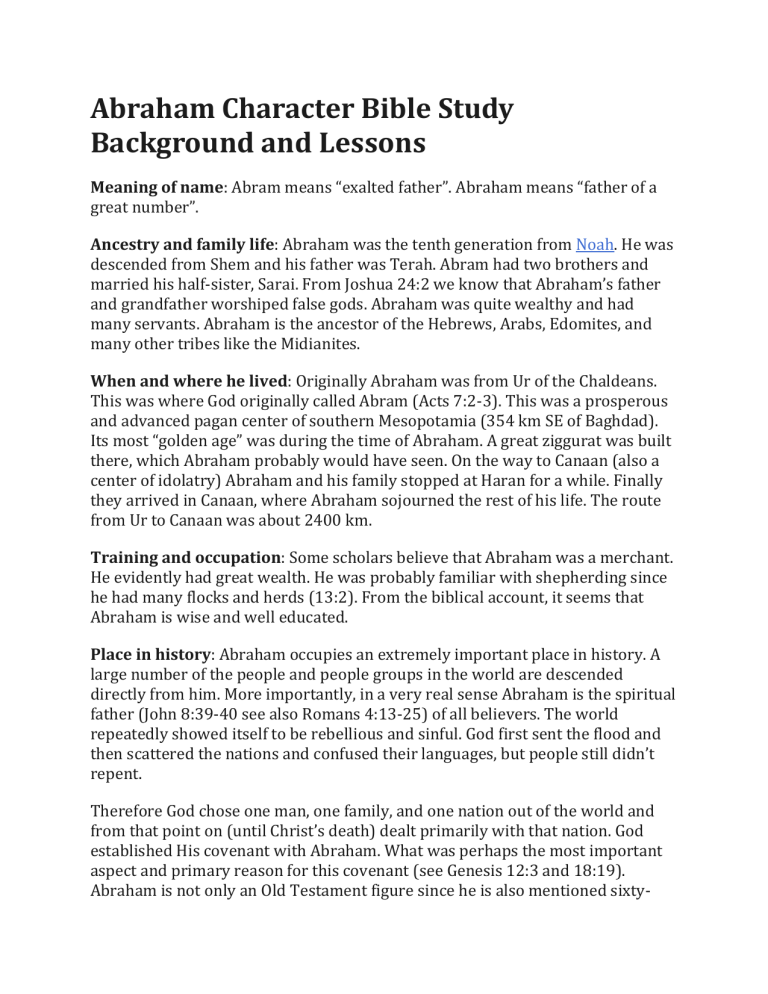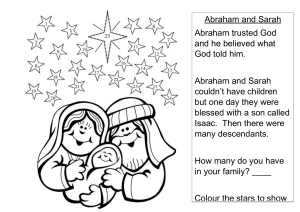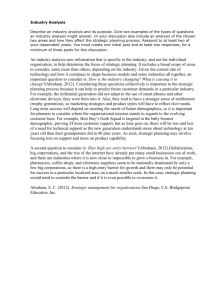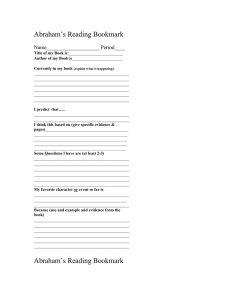
Abraham Character Bible Study Background and Lessons Meaning of name: Abram means “exalted father”. Abraham means “father of a great number”. Ancestry and family life: Abraham was the tenth generation from Noah. He was descended from Shem and his father was Terah. Abram had two brothers and married his half-sister, Sarai. From Joshua 24:2 we know that Abraham’s father and grandfather worshiped false gods. Abraham was quite wealthy and had many servants. Abraham is the ancestor of the Hebrews, Arabs, Edomites, and many other tribes like the Midianites. When and where he lived: Originally Abraham was from Ur of the Chaldeans. This was where God originally called Abram (Acts 7:2-3). This was a prosperous and advanced pagan center of southern Mesopotamia (354 km SE of Baghdad). Its most “golden age” was during the time of Abraham. A great ziggurat was built there, which Abraham probably would have seen. On the way to Canaan (also a center of idolatry) Abraham and his family stopped at Haran for a while. Finally they arrived in Canaan, where Abraham sojourned the rest of his life. The route from Ur to Canaan was about 2400 km. Training and occupation: Some scholars believe that Abraham was a merchant. He evidently had great wealth. He was probably familiar with shepherding since he had many flocks and herds (13:2). From the biblical account, it seems that Abraham is wise and well educated. Place in history: Abraham occupies an extremely important place in history. A large number of the people and people groups in the world are descended directly from him. More importantly, in a very real sense Abraham is the spiritual father (John 8:39-40 see also Romans 4:13-25) of all believers. The world repeatedly showed itself to be rebellious and sinful. God first sent the flood and then scattered the nations and confused their languages, but people still didn’t repent. Therefore God chose one man, one family, and one nation out of the world and from that point on (until Christ’s death) dealt primarily with that nation. God established His covenant with Abraham. What was perhaps the most important aspect and primary reason for this covenant (see Genesis 12:3 and 18:19). Abraham is not only an Old Testament figure since he is also mentioned sixty- seven times in the New Testament. Many of these use Abraham as an example of faith and the fact that God justifies not based on works, but based on faith. Abraham is a model of faith for all believers. Weaknesses: Deceptive (12:12-20, 20) – Abraham was deceptive about his wife Sarah. Two times he said that she was his sister in order to avoid the possibility of being killed. This was a lie. Both of these lies demonstrated a lack of love for his wife. In these cases he was willing to risk her in order to protect himself. He didn’t protect her as well as he should have. Lack of faith at times – Abraham exhibited a lack of trust in God’s promise to give him a son through Sarah, and was easily talked into something that was not God’s will, that is taking Hagar as a wife (16). With Hagar, he followed Sarah’s advice to do things his own way and “help God out”. The result was devastating and is lasting even now. The conflict in the Middle East can all be traced back to this mistake. Strengths: Faith (Hebrews 11:8-12, Gen 12:1-4) – This was Abraham’s most outstanding quality. Although he failed at times, he often showed amazing faith. What are some examples from his life where he showed great faith? He left his home when he didn’t know the final destination. He took the leftover land and let Lot have the good land even though he was the elder and had the right to choose. Abraham believed God’s promise that he would have a son in his old age. Though there were moments of doubt, the general trajectory of his life was belief in the impossible. He was willing to sacrifice Isaac, believing that God would raise him from the dead. Unselfishness (13:9)- How did Abraham show himself to be unselfish? Although he was older than Lot and could have chosen for himself which land to settle in, he gave Lot the first choice. Through this selfless act, God’s will was accomplished and Abraham went to Canaan, where God greatly multiplied him. Later Abraham risked his life to save Lot. In today’s day and age common wisdom is to “look out for number one.” Lot seems to have practiced this. Abraham gave up his “rights” for the good of others. Worshipful – Abraham continually was building alters to God and giving him the glory and praise. This showed his dependence upon God for everything in his life. Tithing (Genesis 14:20, Hebrews 7:4, Mal 3:7-12, 1 John 3:17) – Abraham honored God with his money. He wasn’t greedy and didn’t want to receive spoils or money from the king of Sodom. He instead gave 10% to Melchizedek. Again, God blessed Abraham and multiplied his possessions all the more. Hospitality (Genesis 18)- Abraham was very hospitable to strangers. He invited the three men to eat and killed a calf for them. Persevering in prayer (Gen 18, 20:17)- Abraham pleaded earnestly with God for the inhabitants of Sodom and Gomorrah. Most of these were people he did not know. But his prayer revealed a heart of love and compassion for all people. Not only did he care for them, he was zealous to defend God’s own honor and justice. He boldly “stood in the gap” as an intercessory. We should also pray for others with the same boldness and intensity. Abraham’s Journeys – Created By Study and Obey With Accordance Bible Software Important acts and events: 1. 2. 3. 4. 5. 6. 7. 8. Left his country and went to Canaan. Let Lot take the first of the land. Saved Lot and the King of Sodom. Met Melchizedek. Took Hagar as a wife and had Ishmael. The covenant was reaffirmed with him and received circumcision. Pleaded with God for Sodom and Gomorrah. Obeyed God to sacrifice Isaac, but God spared his son. How he died: He died after a long and fulfilling life at the old age of 175 (25:7). Lessons from his life: 1. We should all be willing to leave our “comfort zone” in order to follow God. Abraham left his country, his friends, and many of his relatives in order to follow God’s call to him. Note that when God told him to go, He didn’t immediately say where. Rather He told Abram to go “to the land I will show you.” So Abram was commanded to start a journey to a destination that still wasn’t revealed. The most important part of God’s command was to go, to start moving. Once Abram was moving it would be easy for him to change direction. But an object that is not moving cannot change directions. At that time, traveling was not nearly as easy as it is today. The final journey was almost two thousand five hundred kilometers long. And there were many unknowns on the way. It was a world far more dangerous than today where the rule of law was not established. But Abraham was obedient. And because of his obedience the world was changed forever. Application: God may ask us to leave our comfort zone in order to follow him. This could take many forms. He may ask you to leave your family and country in order to serve Him. He may ask you to quit your job. He may tell you to share the gospel with somebody when it makes you nervous. He may ask you to befriend another believer or unbeliever and therefore spend less time with your own circle of friends. Are you ready to make sacrifices, to go into the unknown, to put complete faith in God and obey His call? It starts with the small things (Luke 16:10) and as you obey, He will give you larger responsibilities. What do you think is an area where God is calling you to have faith in Him and leave your comfort zone? 2. God isn’t a vengeful God, standing at the ready to destroy us the minute we make a mistake. Abraham made a big mistake in choosing to procreate with Hagar and attempt to have a child through her. While his motivation was to “help” God, he should have realized that God did not need help. It was sinful to go outside of God’s design for marriage to achieve his goals rather than trusting and waiting for His timing. Abraham’s sin caused problems in his marriage and family. These problems are still manifesting in the world today in many conflicts in the Middle East. And yet, even when Abraham failed, God looked out for him and kept His promise. God did not go back on His promise. Instead He forgave and restored Abraham. Application: God is merciful. When we sin, He does not cast us out. Rather, He is waiting with open arms to receive us to Himself again and cleanse us from our sins. 3. Abraham did not take the best for himself, but instead gave others the first choice. We can learn a lot from this attitude. Are we the type of people who always want to pick first, or do we give others the first pick and look out for their interests? Abraham gave Lot the first pick of the land when he had the right to choose. This was no small decision like giving your friend first choice of desserts. It affected where they would live and do business, what land they owned, and who their friends would be. And yet we often quarrel and fight and have wrong motives even over simple things. In what specific areas can you show an unselfish heart toward others and let them choose? (For example let your family choose the restaurant, the television show. Offer to wash the dishes, take out the trash, do the laundry, etc.) The point is that we should be more concerned with others’ well-being than our own. The best thing about this is that when we are concerned about others, God is concerned about us and multiplies our joy and blessings all the more. Lot looked at the land and took what he thought was the best. But in his selfishness, he made the wrong choice. He surrounded his family with bad influences. Clearly he himself was disgusted by some of the practices of the city he chose to live in. Yet the daily exposure to these temptations effected his family. In the end some of his children were killed, his wife was turned to stone, his daughters lost their purity and he himself committed abominations. Abraham on the other hand was blessed and finally his descendants received the Promised Land. Application: When a person takes the best for themselves, they are likely missing out on God’s best. 4. Abraham gave tithes and offerings to Melchizedek. From his example, we learn that we too need to give tithes an offerings to God. This is commanded throughout the Bible (Hebrews 7:4, Malachi 3:7-12, 1 John 3:17). Our money is not our own. It is God’s. Giving to God requires faith. We must believe that God will take care of us and our future even without the funds which we have given up. But if we hold back and prioritize ourselves over God we may find that He is actively working against us. An example of this can be seen in Haggai. When the people refused to build God’s temple and renovated their own houses with luxurious additions, God devoured what they earned and blew it away like dust. When we generously give, God rewards. That sometimes does take the form of financial blessings. After all, God may give more resources to the one who has been faithful to use the one’s he has already. But it does not always take this form. Rewards may be other types of blessings and if you are giving to try to receive some monetary reward from God in return, remember that He sees your heart! When Abraham gave God told him in Genesis 15:1, “I am a shield to you; Your reward shall be very great.” 5. We need to do things God’s way, instead of our way. When we lack faith and lean on our own understanding, we botch things up and make a mess. The result of Abraham’s sin still lives today. Don’t try to come up with a better plan than what you read in the Bible. Don’t’ try to “help God out”. Do things His way. Can you share an example of a time when you tried to do something your own way instead of God’s? What was the result? 6. We should never doubt God. It would have been easy for Abraham to doubt when God told him to sacrifice Isaac, but he had such a strong confidence in God’s character, he knew that the Lord would not lead him astray. In the same way, God will never lead us the wrong way. There will be many times when we do not understand God’s plan. It is like trying to work a puzzle, but only seeing one piece. That piece by itself doesn’t look like much. You can’t tell what it is. But when the whole puzzle is finished, the significance of each piece will be revealed and if even one is missing there will be a glaring hole. Even when we don’t know why God wants us to do something and even if we don’t know where it will lead, we should follow in faith. He leads us step by step. That means that while He may not show us what we should do ten years in the future, He will guide us to what we need to do today. Application: What principle have you learned from Abraham that you think you should follow in your own life? Can you share one specific example of how you will apply that principle this week?


